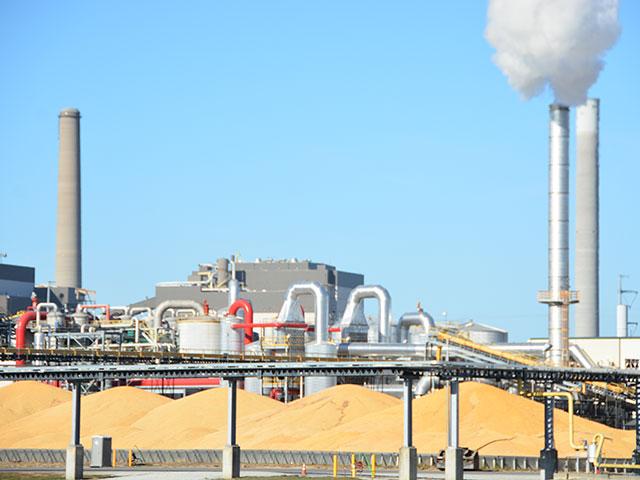EPA Denies 36 RFS Exemptions From 2018
In Pulling Small-Refinery Exemptions From RFS, EPA Offers Refiners a Compliance Reprieve
OMAHA (DTN) -- EPA on Thursday revoked 36 small-refinery exemptions to the Renewable Fuels Standard that the Trump administration had granted for the 2018 compliance year, but EPA also is offering most of the refineries an "alternative compliance approach" that won't require the refiners to make up for 1.4 billion gallons of biofuels or compliance credits.
The decision to retract or deny the small-refinery exemptions (SREs), which is a final order from EPA, comes with a caveat that EPA is going to allow 31 of the refineries to meet their 2018 RFS obligations "without purchasing or redeeming additional RFS credits." EPA stated it is giving 31 refiners more flexibility "because the agency has determined there are extenuating circumstances specific to the set of petitions, including the fact that the SRE petitions were previously granted. Five refiners were dropped because two were declared ineligible and three others withdrew their initial petitions.
The 36 SREs initially approved by the Trump administration involved the equivalent of 1.4 billion gallons of biofuels, or 1.4 billion Renewable Identification Numbers (RINs), which are EPA's compliance credits for refiners to meet their blending volume obligations under the Renewable Fuels Standard.
In offering its "alternative compliance" strategy, EPA cited that the 31 refiners were in a unique situation due to a confluence of factors, mainly involving court decisions. A big part of the challenge is there are a limited number of RINs available for the refiners to go out onto the market. Yet, the compliance approach offered the 31 refineries simply requires them to resubmit their reports on the 2018 RFS requirements but doesn't require them to purchase or use any additional RIN credits.
That prompted the Renewable Fuels Association to call Thursday's decision a "hollow victory" following all of the legal action that was involved.
"Today's action by EPA is a hollow victory for the biofuels industry because the remedy offered doesn't cure the ill," said Geoff Cooper, president and CEO of RFA. "Unfortunately, this action does nothing to replace the 1.4 billion gallons of RFS blending requirements that were ripped away by the Trump administration's reckless refinery waivers. EPA admits that those exemptions never should have been granted in the first place, but now is sweeping them under the rug and letting the refiners who got these exemptions off the hook. The so-called alternative compliance approach issued by EPA is really a no-compliance approach."
P[L1] D[0x0] M[300x250] OOP[F] ADUNIT[] T[]
The 36 SREs have been through a convoluted court process since they were initially granted in August 2019. EPA had been ordered last December by the U.S. Court of Appeals for the D.C. Circuit to issue a ruling on the 2018 SREs within 120 days, and Thursday was the deadline. That court decision came after the Biden administration's EPA had been granted a court stay on the Trump administration's initial approval of the SREs. The D.C. Court remanded the decision back to EPA.
EPA had argued the agency needed to pull the 36 SREs to stay consistent with the Tenth Circuit Court of Appeals ruling on SREs. The Tenth Circuit had concluded that SREs may only be granted when a small refinery's hardship is caused by compliance with the RFS program. The Tenth Circuit decision from 2020 required EPA to create a new interpretation of how to decide on SREs.
On the decision to revoke the 36 SREs, EPA stated, "Today's decision changes and remedies EPA's prior approach to SRE decisions, under which EPA found basis to grant hardship exemptions where no hardship from RFS compliance existed."
EPA stated it reviewed more than a decade of RFS market data and public comments as well as confidential information submitted by the refiners. "EPA concluded that none of the 36 2018 SRE petitions demonstrated hardship caused by compliance with the RFS program," the agency stated.
Petroleum groups had complained that revoking the SREs roughly 2 1/2 years after they were granted raises concerns about RINs and price volatility.
"These refineries have a vested property interest in their approved SREs, which EPA cannot take away without due process of law," the American Fuel & Petrochemical Manufacturers (AFPM) wrote to EPA in February. AFPM stated the refineries have made "innumerable business decisions affecting their finances that could be upended by a sudden, new obligation to purchase and retire RINs, such as decisions regarding loans, capital expenditures, turnaround and maintenance, and other decisions committing financial and other resources based on the assumption they had a valid SRE from 2018."
EPA had released a proposal back in December to reject all pending SRE requests from refiners.
EPA still has 69 pending petitions from refiners for SREs going back as far as the 2016 compliance year, though the bulk of them -- 64 of the petitions -- involve 2019, 2020 and 2021 compliance years.
EPA's denial of petitions: https://www.epa.gov/…
EPA's decision on alternate RFS compliance for certain small refineries: https://www.epa.gov/…
Chris Clayton can be reached at Chris.Clayton@dtn.com
Follow him on Twitter @ChrisClaytonDTN
(c) Copyright 2022 DTN, LLC. All rights reserved.




